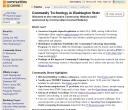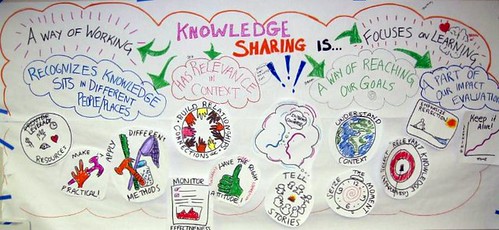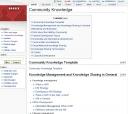 A while ago Beth Kanter put out to her network a request to know about useful nonprofit wiki practices. I meant to reply, but, as usual, got distracted. Today I received an email update about a local coalition here in Washington State (USA) that reminded me about their great wiki work. Check out the Communities Connect Network Wiki . Early on, I had the pleasure of working with Peg Giffels who was their main wiki gardener (among many other roles.) Peg “got” that there was both an information architecture and a set of social processes associated with their use of a wiki as both a project communication tool and as a knowledge sharing tool.
A while ago Beth Kanter put out to her network a request to know about useful nonprofit wiki practices. I meant to reply, but, as usual, got distracted. Today I received an email update about a local coalition here in Washington State (USA) that reminded me about their great wiki work. Check out the Communities Connect Network Wiki . Early on, I had the pleasure of working with Peg Giffels who was their main wiki gardener (among many other roles.) Peg “got” that there was both an information architecture and a set of social processes associated with their use of a wiki as both a project communication tool and as a knowledge sharing tool.
Intially the blog was going to be a general place for coalition members to share stuff. But we all know how general stuff goes — slowly if at all. Then Peg hit on using the wiki to be the central point for the coalitions training programs. Now, at the completion of this last round, Peg has a site that is rich in materials (print, audio, video), has an integrated wiki orientation and training component, reflects specific member areas and contributions (for example here and here) and is well organized and “gardened.” The left navigation links to major areas of the wiki.
One of the things that came out of the early “Wiki Wednesday” hour long telephone based orientations was that people came to get trained, but left with new connections to other coalition members. When asked what was best about the calls — it was always the people they connected with. Peg lives that in the way she works with the coalition. While she stewarded the technology and the content, her attention to the people came across to me, as I observed the wiki development over the months and now years.
Like most wikis, there is a relatively small proportion of editors to page views. For example, in April, there was a rough average of 220 unique visitors per day, 2-3 editors and intermittent spikes of editing across the month. This makes sense given the ‘wind down’ phase as well. There was a huge jump in traffic between February and March. I should ask Peg what was going on!
Interestingly, while this wiki is very focused on Washington state, there are viewers from around the world. I really wish I knew what they thought, in what ways, if any, they benefited from visiting the wiki. I appreciate that the Communities Connect project worked with such openness. They have made a contribution that is bigger than their own project work. I like that about public wikis.
Anyway, I just wanted to share this cool wiki with you. Do you have any great wikis you’d like to share with the rest of us?
P.S. Beth, when I went to find the link on your blog, I noticed two things. Your search box is now waaaay down on the left nav bar of your blog – I almost gave up looking for it. And it is a Technorati search, so I have to go to Technorati and THEN link back to your blog. Maybe consider putting in a Google or other direct search option? I want to find your great stuff FAST! And yes, I’m finally becoming a searcher!
 The ICT-KM Program of the Consultative Group on International Agricultural Research (CGIAR) has an article out about a project that is near and dear to my heart and which I have been working on, the
The ICT-KM Program of the Consultative Group on International Agricultural Research (CGIAR) has an article out about a project that is near and dear to my heart and which I have been working on, the 


